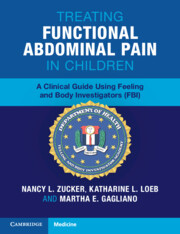 Treating Functional Abdominal Pain in Children
Treating Functional Abdominal Pain in Children from Part I - The Background Science Behind Feeling and Body Investigators
Published online by Cambridge University Press: 18 November 2023
This chapter discusses the literature on parent-child attachment and the qualities and skills required in responsive parenting (as well as in responsive healthcare provision). Readers are introduced to how the steps of the FBI –Pain Division protocol concretely guide parents in the implementation of responsive parenting strategies. There is an emphasis on the mutability of the system: it is never too late to gain and provide potent benefit by honing responsive parenting skills. This approach establishes a secure base of attachment between parent and child, yielding not dependency but the courage and sense of safety necessary for confident exploration of one’s environment. Responsive parenting also facilitates self-parenting in offspring. One of the tasks of childhood and adolescence is to become our own “self-parents”: attune to our needs, game for investigating further when our needs are elusive, and ready, willing, and able to respond to our needs effectively. When children are taught to be masterful “self-parents”, their self-knowledge and self-trust further contribute to their confidence in venturing out to experience what the world has to offer.
To save this book to your Kindle, first ensure [email protected] is added to your Approved Personal Document E-mail List under your Personal Document Settings on the Manage Your Content and Devices page of your Amazon account. Then enter the ‘name’ part of your Kindle email address below. Find out more about saving to your Kindle.
Note you can select to save to either the @free.kindle.com or @kindle.com variations. ‘@free.kindle.com’ emails are free but can only be saved to your device when it is connected to wi-fi. ‘@kindle.com’ emails can be delivered even when you are not connected to wi-fi, but note that service fees apply.
Find out more about the Kindle Personal Document Service.
To save content items to your account, please confirm that you agree to abide by our usage policies. If this is the first time you use this feature, you will be asked to authorise Cambridge Core to connect with your account. Find out more about saving content to Dropbox.
To save content items to your account, please confirm that you agree to abide by our usage policies. If this is the first time you use this feature, you will be asked to authorise Cambridge Core to connect with your account. Find out more about saving content to Google Drive.